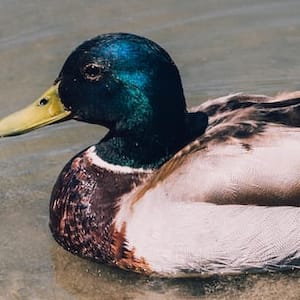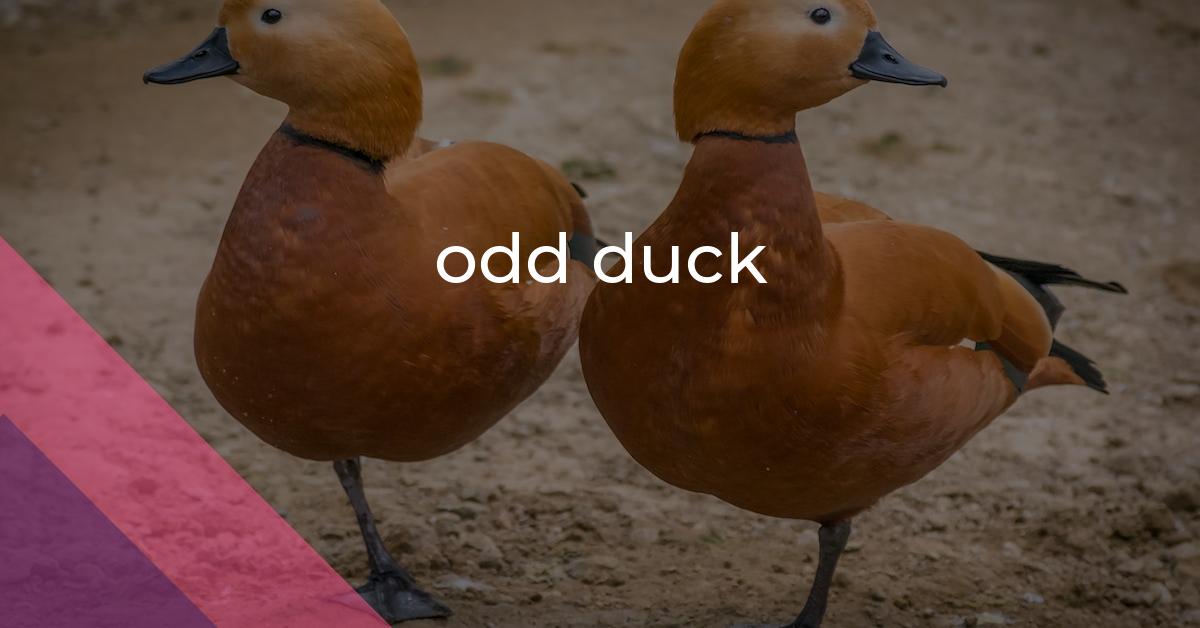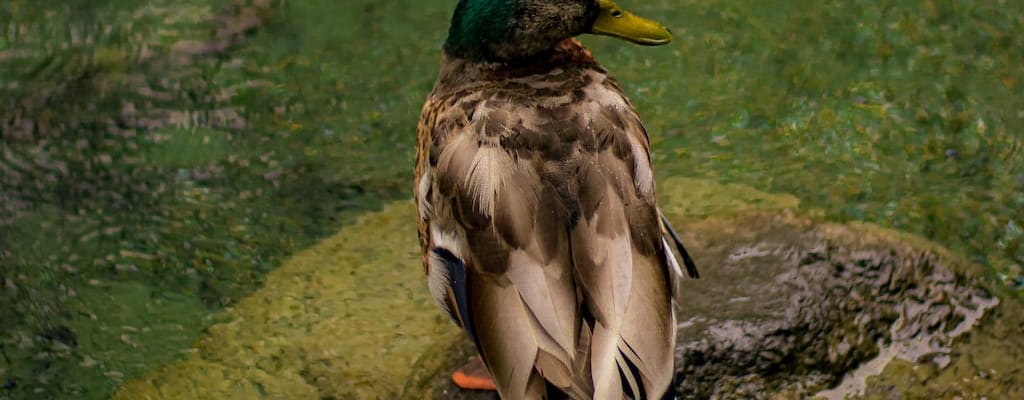odd duck: Idiom Meaning and Origin
What does ‘odd duck’ mean?
The idiom "odd duck" refers to a person who is strange, eccentric, or unconventional compared to others. They stand out in a peculiar way and are often seen as different or unusual.

Idiom Explorer
The idiom "ugly duckling" refers to someone or something that is initially perceived as unattractive or of little value, but later develops into something beautiful or successful.
An idiom used to describe someone or something that is highly unusual or unique; as rare as a rare animal.
The idiom "out of one's box" means to be acting in an unconventional or unexpected way, deviating from one's usual behavior or habits.
The idiom "out of character" means behaving in a way that is not typical or usual for a person, often surprising others due to the deviation from their usual behavior.
The idiom "other than" is used to indicate an exception or exclusion, suggesting that something or someone is different from or does not fall into a particular category or condition.
The idiom "one of those things" refers to a situation or event that is out of one's control, often unexpected or difficult to explain or understand.
The idiom "one-off" refers to something that happens or is done only once, and is not repeated or meant to be continuous.
The idiom "one and only" means the unique or singular example of something or someone. It emphasizes that there is no other comparable or similar entity.
The idiom "of an" is used to emphasize a particular quality or characteristic of someone or something. It indicates that the quality being mentioned is extremely notable or outstanding.
The idiom "of a kind" is used to describe something or someone that is similar to something or someone else, but not exactly the same. It implies a resemblance or similarity between two things, but also highlights their unique qualities or differences.
Deciphering the Peculiar Fowl
The idiom "odd duck" is a phrase used in American English to describe someone who is peculiar or eccentric. It refers to individuals who stand out from the crowd due to their unconventional behavior or appearance. Rather than being used in a derogatory way, this phrase is often employed in a lighthearted or affectionate manner.
The origin of this idiom dates back to the early 20th century. The word "odd" has long been used to mean "peculiar" or "unusual," while "duck" has been associated with various characteristics such as quirkiness or oddity. Combining these two words gave rise to the phrase "odd duck," which naturally evolved in language over time.
In the mid-20th century, the idiom gained popularity and became a common phrase in everyday conversation. It is often used to describe individuals who exhibit unusual behavior, have unconventional interests, or simply march to the beat of their own drum.
When someone refers to another person as an "odd duck," it is usually meant as a mild form of teasing or playful banter. By using this idiom, they acknowledge the person's unique qualities while also highlighting their differences from the norm.
Aside from individuals, the idiom can also be applied to objects or situations that are out of the ordinary or unexpected. For example, one might refer to a brightly colored car in a sea of white vehicles as an "odd duck."
However, it is important to note that the idiom "odd duck" is subjective in nature. What one person considers odd or unusual, another may perceive as normal. The context in which the phrase is used is crucial in understanding its intended meaning.
The term "odd fish" is closely related to the idiom "odd duck." Both phrases describe individuals who deviate from the norm and stand out from the crowd. An "odd fish" is someone who is unusual or eccentric, just like an "odd duck." These idioms highlight the diversity of human experiences and the potential for individuality in an otherwise uniform world.
Another related idiom is "odd and curious." This phrase describes individuals who are both peculiar and inquisitive. It suggests that their unusual nature is accompanied by a sense of curiosity and a willingness to explore new ideas or perspectives. Similar to an "odd duck," someone who is described as "odd and curious" possesses qualities that set them apart from others.
The idiom "ugly duckling" is often used to describe a person or thing that initially appears unattractive or unremarkable but later transforms into something beautiful or extraordinary. It is often used metaphorically to convey the idea that appearances can be deceiving and that true value lies beneath the surface. While an "odd duck" may not necessarily transform into something beautiful, both idioms emphasize the importance of looking beyond outward appearances and recognizing the value of uniqueness.
A "lucky duckling" is an idiomatic phrase that refers to someone who experiences unusually good fortune. This idiom suggests that despite being considered odd or different by others, the individual in question is fortunate in various aspects of their life. It implies that being an "odd duck" can bring unexpected benefits or opportunities.
The idiom "rare animal" is another expression closely related to "odd duck." Both idioms are used to describe individuals who are unique or uncommon in some way. While a "rare animal" may explicitly refer to a living creature, an "odd duck" can encompass any aspect of peculiarity or singularity. Both of these idioms highlight the beauty and significance of individuals who stand out from the crowd.
Example usage
Examples of how the idiom "odd duck" can be used in a sentence:
- She was always the odd duck in the family, with her unconventional interests and eccentric habits.
- John prefers solitude and rarely socializes, making him an odd duck among his extroverted friends.
- With his unusual fashion choices and quirky sense of humor, Mark was definitely an odd duck in his office.
The idiom "odd duck" is used to describe someone who is different or eccentric compared to the rest of a group or community. It implies that the person stands out and does not conform to the norm. The phrase often carries a connotation of being unconventional, peculiar, or strange in a harmless or unique way. It is frequently used to emphasize someone's idiosyncrasies or peculiar behavior that sets them apart from others.
More "Idioms" idioms



